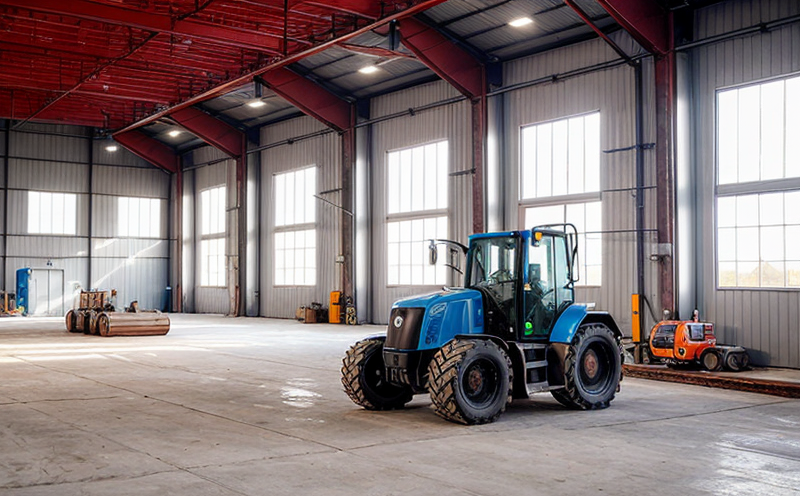Industrial Equipment Certification: A Guide to Future Trends
The industrial equipment industry has witnessed significant growth over the years, driven by increasing demand for efficient and reliable machinery. As technology advances, manufacturers are focusing on developing innovative products that meet evolving customer needs. One critical aspect of this process is certification a vital step in ensuring compliance with industry standards, safety regulations, and customer expectations.
Why Certification Matters
Certification plays a crucial role in the industrial equipment industry for several reasons:
Compliance: Manufacturers must comply with regulatory requirements, such as those set by OSHA (Occupational Safety and Health Administration) or EUs Machinery Directive. Certification ensures that products meet these standards, reducing the risk of fines or penalties.
Customer Confidence: Certification builds trust among customers, who expect equipment to be safe, reliable, and efficient. Certified products demonstrate a manufacturers commitment to quality and performance.
Market Competitiveness: In a crowded market, certification can be a differentiator for manufacturers. It shows that their products have been rigorously tested and meet strict standards.
Types of Certifications
Industrial equipment manufacturers can opt for various certifications, depending on their product types and target markets. Some common certifications include:
CE Marking: Required for products sold in the European Union, CE marking ensures compliance with EU directives and regulations.
UL Certification: Offered by Underwriters Laboratories (UL), this certification focuses on safety and performance standards for products like electrical equipment and machinery.
API Certification: The American Petroleum Institute (API) offers certification for oil and gas industry equipment, ensuring compliance with industry-specific standards.
Industry Trends: What to Expect in the Future
As technology advances and customer expectations evolve, manufacturers must adapt to changing trends. Some key developments that will shape the industrial equipment certification landscape include:
Digitalization: The increasing use of IoT (Internet of Things) technologies, sensors, and data analytics will lead to more sophisticated and connected products.
Sustainability: With growing concerns about environmental impact, manufacturers are focusing on developing eco-friendly equipment that reduces waste and energy consumption.
Modular Design: Modular design is becoming increasingly popular, allowing for easier assembly, disassembly, and maintenance of industrial equipment.
Certification Considerations: A Closer Look
Here are some detailed considerations for certification in bullet point format:
Understanding Industry Regulations
Manufacturers must be familiar with industry-specific regulations, such as those related to electrical safety (UL), machinery safety (EUs Machinery Directive), or oil and gas industry standards (API). Compliance with these regulations is crucial to avoid fines, penalties, or product recalls.
Regulatory Updates: Manufacturers should stay informed about regulatory updates and changes to ensure their products remain compliant.
Compliance Audits: Regular audits can help identify areas for improvement and demonstrate a manufacturers commitment to compliance.
Industry Associations: Joining industry associations like the National Electrical Manufacturers Association (NEMA) or the American Petroleum Institute (API) can provide access to resources, training, and networking opportunities.
Certification Process: Step-by-Step
The certification process typically involves several steps:
1.
Identifying Certification Needs: Manufacturers must determine which certifications are required for their products based on market requirements, regulatory compliance, or industry standards.
2.
Preparation: Before submitting a product for certification, manufacturers should ensure it meets the necessary criteria by conducting internal testing and evaluations.
3.
Certification Body Selection: Choose a recognized certification body (CB) that specializes in industrial equipment certifications, such as UL or API.
4.
Testing and Evaluation: The CB will conduct thorough testing and evaluation to verify product compliance with industry standards and regulations.
5.
Certification Issuance: If the product meets all requirements, the certification body issues a certificate of conformity.
Maintaining Certification: Ongoing Requirements
To maintain certification, manufacturers must adhere to ongoing requirements:
Continuous Improvement: Regularly review and update products to ensure they remain compliant with changing industry standards and regulations.
Re-certification: Re-certify products at predetermined intervals (typically every 3-5 years) to demonstrate ongoing compliance.
Training and Education: Stay informed about regulatory changes, new technologies, and best practices through training programs and workshops.
Frequently Asked Questions
Q: What is the primary purpose of industrial equipment certification?
A: The primary purpose of industrial equipment certification is to ensure compliance with industry standards, safety regulations, and customer expectations. It also helps build trust among customers by demonstrating a manufacturers commitment to quality and performance.
Q: How often should manufacturers re-certify their products?
A: Re-certification intervals vary depending on the certification body and product type, but typical intervals range from 3-5 years.
Q: Can I obtain multiple certifications for my industrial equipment?
A: Yes, manufacturers can opt for various certifications based on market requirements, regulatory compliance, or industry standards. Each certification may have its own set of requirements and testing protocols.
Q: How do I choose the right certification body (CB) for my product?
A: Research recognized CBs that specialize in industrial equipment certifications, such as UL or API. Ensure they are accredited by a third-party organization like the International Accreditation Forum (IAF).
Q: What is the cost of obtaining industrial equipment certification?
A: Certification costs vary depending on factors like product complexity, testing requirements, and CB fees. Manufacturers should factor these expenses into their budget to ensure compliance with industry standards.
In conclusion, industrial equipment certification is a critical aspect of ensuring compliance with industry standards, safety regulations, and customer expectations. As technology advances and market trends evolve, manufacturers must adapt to changing certification needs while maintaining ongoing compliance requirements. By understanding industry regulations, the certification process, and ongoing maintenance requirements, manufacturers can ensure their products meet evolving customer demands while minimizing risks associated with non-compliance.

































